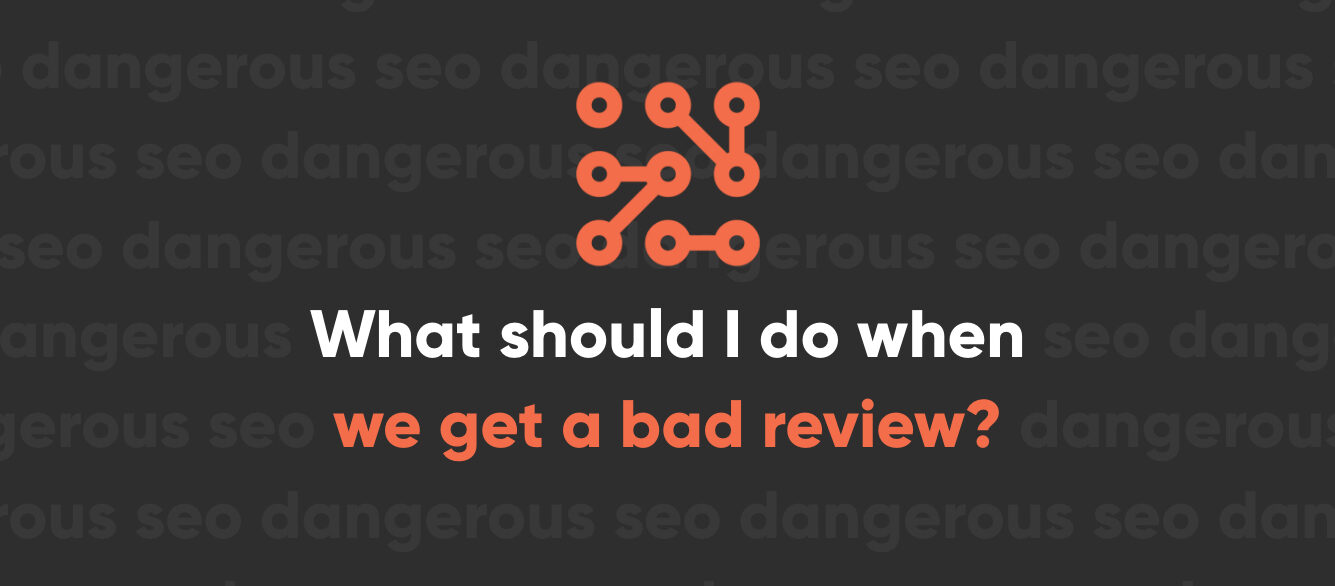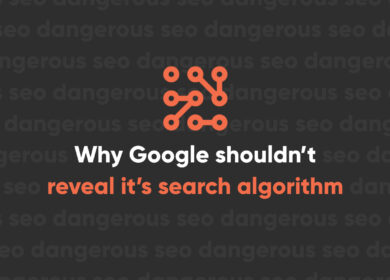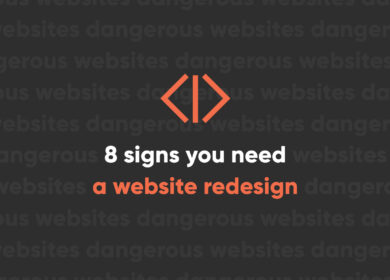
What Should I Do When My Business Gets a Bad Review?

So you’ve just received a scathing online review. Now you’re worried your business is on the verge of ruin. You’re torn between rage, depression, and unreasonable feelings of revenge. What can be done about this horrible strike against your company image?
Bad reviews are inevitable. After all, no one is universally loved (heck, there are still a few people out there who think The Beatles were terrible). The good news is that a bad review doesn’t have to be the end of your business. In fact, it’s probably not anywhere near as bad as it may seem.
The Bad and the Good of Reviews
Online reviews are important. They are often the first impression a customer has of your business. They also have a high correlation with local search rankings (more good reviews generally means better local rankings).
People tend to leave online reviews for two reasons:
- They’re really happy with a service
- They’re really disgusted with a service
Sure, there are some people who just review everything—mostly because they want to pad their review stats. But the majority of reviews are either going to be glowing or scathing. Most people don’t bother going to Yelp or Google to tell the world how a business was just okay.
No matter how many good reviews you have, even one bad review can feel like doomsday for your company. On a certain level, it’s true. Bad reviews do turn people away. Bad reviews have even caused some businesses to close their doors. But that’s the rare exception. In most cases, a few negative reviews are just minor speedbumps.
That doesn’t mean you shouldn’t do something about those reviews. Remember, your reputation is at stake here, and those bad reviews are a threat. Unfortunately, these bad reviews often trigger a knee-jerk reaction that can hurt your business worse than the review. It’s often tough for business owners to decide how to react to these stains on their company record. Before we discuss what you should do about a bad review, let’s look at what you definitely shouldn’t do.
Don’t Pay to Have the Bad Reviews Removed
One of our first reactions to getting bad publicity is to eliminate it. There are plenty of services that tell you they can get your negative reviews removed. Of course, this usually comes with a hefty price tag and no guarantees. After all, these services don’t work for the review sites, so they ultimately have no control.
If you can’t pay a third-party to remove it, why not just pay the review site? There have been plenty of rumors that giving money (in the form of advertising, that is) to Yelp will cause those bad reviews to disappear (on the flipside, there are plenty of theories that not giving money to Yelp will cause more bad reviews to appear). Yelp conspiracy theories aside, this isn’t a path you want to travel. Not only is there no definitive proof that it works, but it’s also expensive (how exactly do you calculate the ROI of trying to hide reviews?).
So if you can’t pay a third-party or the review site, why not just give the reviewer some money to remove it? I’m going to pretend you didn’t ask that. Imagine the backlash when that reviewer adds your bribe attempt to the review. Here’s the bottom line: don’t offer anyone any money to remove a bad review. It just isn’t worth it. Even worse is trying to sue the bad reviewer.
Don’t Publicly Shame the Reviewer
Since you can’t pay to have the review eradicated, why not just go on the attack? Tell the world that the reviewer is wrong, that you provided the best service in the world. While you’re at it, use colorful language and make the reviewer look like a horrible person. That’ll do wonders for your online reputation! Don’t they say the customer is always wrong?
Potential customers are more likely to believe past customers than they are to believe your side of the story. If you come across as overly defensive or insulting in your response, you’ll always look like the bad guy. Keep in mind that you are the only one with something at stake here. An attack on the reviewer probably won’t lead to customers boycotting that person’s reviews (and even if they do, there’s no loss to that reviewer). Beating the reviewer in the public landscape is always going to be a losing battle.
Don’t Counter It with Fake Reviews
Fake reviews have long been the scourge of the online review system. They ultimately reduce the public’s confidence in reviews. Many online review sites have (or at least claim they have) found ways to combat fake reviews. At best, fake reviews are a waste of time. You’ll take the time to create them and they won’t be displayed. At worst, they can actually discourage potential customers. When there are loads of fake 5-star reviews and a couple obviously real 1-star reviews, your potential customers are probably going to notice. You may think you’re being clever, but fake reviews often read like fake reviews. If it walks like a duck and quacks like a duck…
So What Should I Do?
Okay, knowing what not to do is nice, but knowing what you should do is even better. When you get a bad review, you need to do these three things as soon as possible:
Do Respond Politely
You should always respond to your reviews. A bad review with no response tells the world that you don’t care about your customer’s experience. Your response should always be short and professional. Be sure to include these two elements:
- An apology (We’re sorry you had this experience…)
- A solution (Please contact us so we can resolve the problem…)
Remember, never argue. Never tell the customer that he or she was wrong. Let the world know that you want to work it out. This makes future customers less worried about working with you.
Do Encourage Positive Reviews from Other Customers
The best way to overcome a bad review is with good reviews. Real reviews. We’ve already discussed the fake review route. Instead, you need to have a legitimate follow-up process that encourages your satisfied customers to leave reviews. Don’t pay them to do it. Don’t beg them to do it. Just point them in the right direction. Be sure to align these efforts with the policies of each review site (for example, Yelp says it’s okay to say "See us on Yelp" but not okay to say "Review us on Yelp"). Also, be sure to stagger your efforts. It’s going to look mighty suspicious if a dozen 5-star reviews come in on the same day. Encouraging reviews shouldn’t be a one-time effort. Incorporate this into your overall marketing efforts.
Do Learn from Your Mistakes
Even if the review seems a bit harsh to you, chances are there is some truth to it. You may not agree, but this is how the customer felt about the experience of working with you. Rather than getting angry at the customer, take an honest look at the services or processes in question. This involves looking into the situation and determining what went wrong. Try to see things from the upset customer’s point of view. Maybe you really did screw up. Maybe you could improve your communication. Maybe you need to work on customer service. Maybe your billing policies don’t line up with the expectations you set on your website. Also, be sure to look for recurring patterns in bad reviews. If several reviewers are saying your employees are rude, then your employees are probably rude. Sometimes the best way to fix a negative review is to fix what caused the negative review.
Conclusion
A business can live and die by its reviews. Fortunately, the choice to live or die is often in the hands of the business, not the reviewers. By taking a proactive approach to online reviews, you can effectively bury those few disgruntled customers.
This post is part of Internet Marketing Mysteries, a weekly column addressing actual client questions related to SEO, analytics, website best practices, and any other topic connected to internet marketing. Have a question you’d like to see tackled in a future post? Let us know in the comments.

Nate Tower
Nate Tower is the President of Perrill and has over 12 years of marketing and sales experience. During his career in digital marketing, Nate has demonstrated exceptional skills in strategic planning, creative ideation and execution. Nate's academic background includes a B.A. with a double major in English Language and Literature, Secondary Education, and a minor in Creative Writing from Washington University. He further expanded his expertise by completing the MBA Essentials program at Carlson Executive Education, University of Minnesota.
Nate holds multiple certifications from HubSpot and Google including Sales Hub Enterprise Implementation, Google Analytics for Power Users and Google Analytics 4. His unique blend of creative and analytical skills positions him as a leader in both the marketing and creative worlds. This, coupled with his passion for learning and educating, lends him the ability to make the complex accessible and the perplexing clear.



